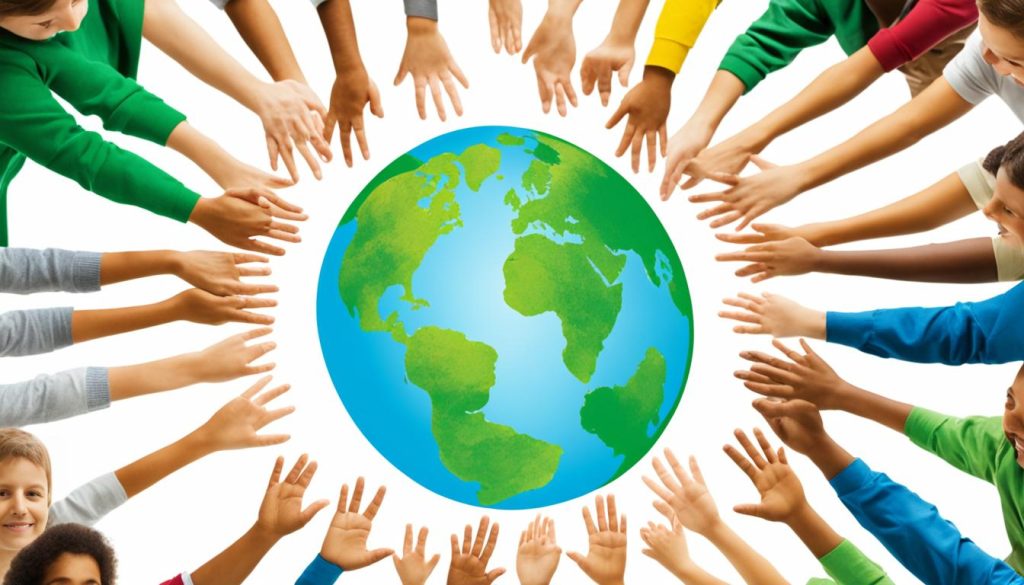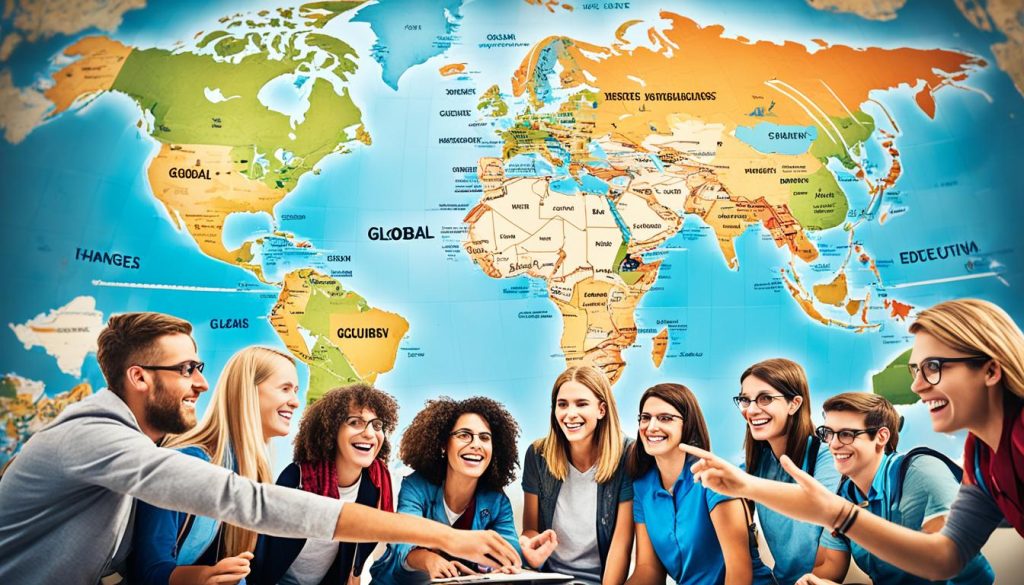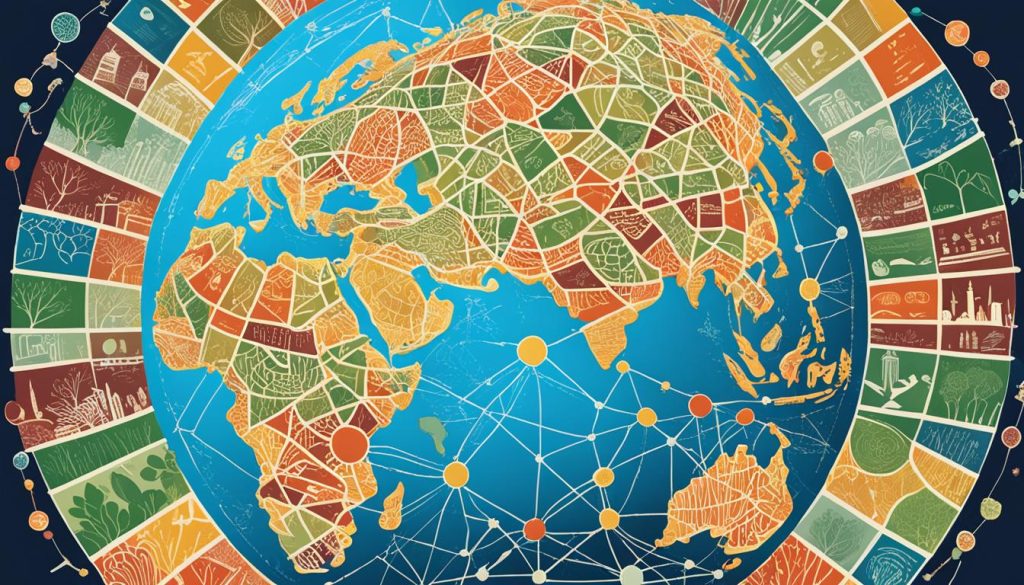- 1. Internet’s Transformative Impact on Education
- 2. Transforming Education with Global Goals
- 3. Connecting Classrooms Globally
- 4. Education for a Global World
- 5. Project-Based and Problem-Based Learning
- 6. Integrating Global Issues Across Subjects
- 7. Empowering Students as Change Agents
- 8. Professional Development for Educators
- 9. Conclusion
- 10. FAQ
- 10.1 How has the internet revolutionized education?
- 10.2 How can global education programs transform learning?
- 10.3 How can sustainable development goals (SDGs) be integrated into education?
- 10.4 How can global collaboration and cultural literacy be developed in the classroom?
- 10.5 What are the key skills and competencies for global citizenship?
- 10.6 How can project-based and problem-based learning transform global education?
- 10.7 How can global issues be integrated across the curriculum?
- 10.8 How can students be empowered as global change agents?
- 10.9 What professional development opportunities are available for educators to implement global education programs?
- 11. Source Links
In our increasingly interconnected world, education has undergone a remarkable transformation, thanks in large part to the ubiquity of the internet. The digital age has revolutionized several industries, including the education sector, impacting every facet of our lives. The accessibility and scope of online resources have fundamentally changed how students study and how teachers disseminate information. The internet has significantly altered the way people learn, opening up new possibilities for independent study, teamwork, and research.
In this article, we’ll explore how the internet has profoundly impacted education and transformed the way individuals learn in the contemporary world. We’ll delve into the internet’s transformative influence on education, from enhanced access to knowledge to collaborative learning opportunities and personalized learning experiences. Additionally, we’ll examine how integrating global goals, technology, and innovative pedagogies can further transform education to prepare students for the challenges of our interconnected world.
Key Takeaways
- The internet has revolutionized education, enabling greater access to knowledge, collaborative learning, and personalized experiences.
- Integrating global goals, technology, and innovative pedagogies can further transform education to prepare students for the challenges of our interconnected world.
- Connecting classrooms globally, nurturing global citizenship, and empowering students as change agents are crucial to equipping the next generation with the mindset, skills, and passion to create positive change.
- Investing in professional development for educators is essential to successfully implementing these global education initiatives.
- Education for a global world must foster cross-cultural competence, intercultural communication skills, and a deep understanding of diverse perspectives.
Internet’s Transformative Impact on Education
The internet has revolutionized the educational landscape, offering unprecedented access to knowledge, fostering collaborative learning, and enabling personalized learning experiences. By leveraging the power of the digital age, we can empower students to explore their passions, engage with diverse perspectives, and develop the skills necessary to thrive in our interconnected world.
Access to Knowledge
The internet’s unique access to knowledge is among its most significant educational contributions. Students can now explore a wide range of subjects beyond the traditional curriculum, accessing scholarly articles, eBooks, and online courses. This enhanced access to information allows learners to delve deeper into their areas of interest, nurturing a spirit of curiosity and lifelong learning.
Collaborative Learning
Collaborative learning, facilitated by the internet, encourages students to actively engage with their peers, teachers, and resources to collectively construct knowledge and solve problems. Through various digital tools and platforms, students can seamlessly communicate, share information, and collaborate on projects, fostering a sense of community and shared understanding.
Personalized Learning
The internet has also made education more individualized and adaptable to different learning styles. Utilizing data analytics, online learning platforms, and adaptive technologies, we can personalize student learning opportunities based on their skills, strengths, and preferred learning modalities. This approach empowers students to progress at their own pace and develop their unique talents and abilities.
Transforming Education with Global Goals
The United Nations Sustainable Development Goals (SDGs) provide an excellent framework to transform educational practices and empower learners as global citizens. The SDGs, also known as the 2030 Agenda, represent an urgent call for action by all countries to address critical worldwide challenges through a global partnership. It is essential for students to understand the significance and interconnectedness of these 17 SDGs and their role in achieving a more sustainable and equitable future.
Introducing Sustainable Development Goals (SDGs)
The SDGs cover a wide range of social, economic, and environmental issues, from ending poverty and hunger to promoting quality education, gender equality, and climate action. By introducing these global goals into the classroom, we can inspire students to think critically about the world’s most pressing problems and develop the knowledge, skills, and mindset to become active agents of change.
Social and Emotional Learning
Integrating social and emotional learning (SEL) into the curriculum can also be a powerful way to transform education with a global perspective. By fostering self-awareness, empathy, and interpersonal skills, SEL helps students better understand themselves and their place in the world, as well as develop the emotional intelligence to navigate cross-cultural interactions and collaborative problem-solving.
Integrating Technology
Leveraging technology in the classroom can further enhance the integration of global goals and SEL. Digital tools and platforms can facilitate interactive learning experiences, collaborative projects, and virtual exchanges that expose students to diverse perspectives and cultivate their intercultural communication skills. When used thoughtfully and with a strong pedagogical foundation, technology can create engaging and meaningful learning opportunities that prepare students for the challenges of our interconnected world.

Connecting Classrooms Globally
In our increasingly interconnected world, the internet has revolutionized the way students and academic institutions communicate, collaborate, and share knowledge across borders. This exchange of ideas and cultural awareness has not only enhanced the educational process but also promoted greater tolerance and prepared students to become global citizens in a world that is growing more interconnected every day.
Fostering Cross-Cultural Collaboration
The internet has been crucial in altering education and equipping students to thrive in a diverse and interconnected global society. By encouraging a worldwide viewpoint and cultural interchange, the internet has enabled academic institutions and students worldwide to communicate, work together, and share knowledge in unprecedented ways. This collaborative learning environment fosters cross-cultural competence, intercultural communication skills, and a deeper understanding of global issues.
Developing Cultural Literacy
Through online platforms and virtual exchanges, students now have the opportunity to engage with their peers from different backgrounds, learn about diverse cultures and perspectives, and develop a more comprehensive awareness of world affairs. This exposure to multicultural learning environments and the acquisition of world languages are crucial in cultivating global citizenship and preparing students to navigate the challenges of our interconnected world.
Education for a Global World
In our increasingly interconnected world, international education programs are crucial in empowering learners with cross-cultural competence and global citizenship skills. Thanks to the internet, students can now communicate across cultures, learn about diverse customs and beliefs, and develop a more comprehensive awareness of world concerns. This digital revolution has transformed education, encouraging a worldwide viewpoint and cultural interchange that prepares students to flourish in a diverse and connected global society.
Nurturing Global Citizenship
Education needs to be personalized, with teachers creating an environment that inspires students to learn and naturally discover their passions. UNESCO calls for transformative education that “involves teaching and learning geared to motivate and empower happy and healthy learners to take informed decisions and actions at the individual, community and global levels.” By fostering global citizenship, we can empower the next generation with the mindset, skills, and passion to create positive change in our interconnected world.
Multicultural Perspectives
Embracing multicultural perspectives in the classroom is crucial for developing cross-cultural competence and preparing students to thrive in our diverse and inclusive global society. Through study abroad programs, world languages learning, and immersive intercultural communication experiences, students can gain a deeper understanding and appreciation for diverse cultures, customs, and worldviews.
Intercultural Communication Skills
In addition to nurturing global citizenship and multicultural awareness, education must also focus on equipping students with essential intercultural communication skills. By developing competencies in areas like active listening, empathy, and cross-cultural collaboration, students will be better prepared to navigate the challenges and opportunities of our interconnected world and contribute as engaged global citizens.

Project-Based and Problem-Based Learning
The NGC Classroom Program offers a robust curriculum that utilizes a combination of research-based pedagogies, including project-based and problem-based learning, to help teachers integrate global issues into their content areas. Through hands-on student activities and thought-provoking resources, this program provides a deeper understanding of global issues that align with the Sustainable Development Goals (SDGs) and 21st-century skills.
By engaging in project-based and problem-based learning, students not only develop crucial intercultural communication skills and global citizenship, but they also strengthen their academic discourse, critical thinking, and problem-solving abilities. This multifaceted approach equips students with the mindset, knowledge, and skills to become active participants in addressing global challenges and creating positive change in their communities and beyond.
The NGC Classroom Program’s curriculum is further designed to align with Common Core Standards and 21st Century Skills, ensuring that students acquire the necessary competencies to thrive in our interconnected, multicultural world.
Integrating Global Issues Across Subjects
At the heart of our approach to transformative education lies the integration of global issues across different academic disciplines. By weaving cross-cultural competence, international education, and sustainable development goals into the fabric of our curriculum, we empower students to develop a holistic, interconnected understanding of the world around them.
Interdisciplinary Approach
The NGC curriculum utilizes a research-based, interdisciplinary approach to engage students in exploring global challenges from multiple perspectives. Through project-based and problem-based learning activities, students delve into topics such as global citizenship, intercultural communication, and world languages acquisition, applying critical thinking and collaborative skills to find innovative solutions.
Aligning with Common Core Standards
Recognizing the importance of standards-aligned learning, the NGC curriculum is designed to seamlessly integrate with Common Core Standards and 21st Century Skills. This ensures that our students not only develop a deep understanding of global issues but also acquire the essential academic and life skills needed to thrive in our interconnected world.

| Global Issue | Interdisciplinary Connections | Relevant Common Core Standards |
|---|---|---|
| Poverty and Inequality | Economics, Political Science, Sociology | CCSS.ELA-LITERACY.RH.11-12.2, CCSS.MATH.CONTENT.HSA.CED.A.1 |
| Climate Change | Environmental Science, Geography, Engineering | CCSS.ELA-LITERACY.RST.11-12.8, CCSS.MATH.CONTENT.HSS.ID.A.1 |
| Gender Equality | History, Literature, Social Studies | CCSS.ELA-LITERACY.RH.11-12.9, CCSS.MATH.CONTENT.HSS.ID.B.6 |
Empowering Students as Change Agents
New Global Citizens (NGC) has been working tirelessly to empower students as global citizens, equipping them with the mindset, skills, and passion to collaborate across borders and create positive change. Through its classroom, after-school, and community-based programs, NGC has engaged thousands of young people in hundreds of grassroots, community-driven initiatives aimed at addressing pressing global issues.
Grassroots Community Initiatives
By providing students with the necessary resources, guidance, and support, NGC has enabled them to spearhead their own grassroots community initiatives. These projects not only help solve local challenges but also foster a deeper understanding of the interconnectedness of global problems. Students learn to think critically, empathize with diverse perspectives, and work in partnership with their peers to create meaningful, sustainable solutions.
Youth-Led Global Projects
Beyond local efforts, NGC also empowers students to tackle global issues through collaborative, cross-border projects. By starting an NGC Team on their middle or high school campus, students gain access to a wealth of lessons, activities, and guides that help them explore NGC’s 10 Global Issues and select a project they want to support throughout the academic year. This hands-on approach encourages students to think globally, act locally, and develop the skills necessary to become the next generation of change agents.
Professional Development for Educators
To successfully integrate
global citizenship education
,
world languages learning
, and other
international educational programs
into the curriculum, providing robust professional development for educators is crucial. At VIF Global Schools, teachers are equipped with the necessary knowledge, skills, and resources through an inquiry-based professional development approach.
Inquiry-Based Training
VIF’s professional development model is centered around culturally responsive and dual language instruction. Teachers engage in inquiry-based learning, exploring curricular materials, instructional support, and access to an online community of global educators. One of the most notable features of this approach is the digital badging system, which allows VIF’s global teachers to demonstrate their classroom implementation and growing expertise in intercultural communication skills, cross-cultural competence, and other essential global teaching practices.
Online Collaborative Learning Platform
Through the acquisition of Participate Learning, the VIF Learning Center now offers an enhanced collaborative learning platform that integrates the content and curricular resources from the New Global Citizens (NGC) program. These resources are designed to develop key skills in leadership, collaboration, civic-engagement, critical thinking, problem solving, digital literacy, and project management – competencies that are essential for students to thrive in our interconnected world and contribute to the achievement of the Sustainable Development Goals (SDGs) in education.

Conclusion
In our globally-connected world, international education programs empower learners with cross-cultural competence and global citizenship skills through immersive experiences like study abroad and world languages learning. The internet has revolutionized education, transforming learning in the digital age through enhanced access to knowledge, new collaborative opportunities, and personalized learning experiences. Integrating global goals, technology, and innovative pedagogies like project-based learning can further transform education to prepare students for the challenges of our interconnected world.
By connecting classrooms globally, nurturing global citizenship, and empowering students as change agents, we can equip the next generation with the mindset, skills, and passion to create positive change. Investing in professional development for educators is also crucial to successfully implementing these global education initiatives that foster education for a global world, cross-cultural competence, international education, global citizenship, intercultural communication, study abroad programs, world languages learning, diversity and inclusion, international educational programs, global citizenship education, study abroad opportunities, multicultural learning environments, intercultural communication skills, world languages acquisition, collaborative online international learning (coil), and alignment with the sustainable development goals (sdgs) in education.
FAQ
How has the internet revolutionized education?
The internet has significantly impacted education by enhancing access to knowledge, fostering collaborative learning, and enabling personalized learning experiences. Students can now explore their interests and learn about a wide range of subjects beyond the traditional curriculum, thanks to the availability of online resources. The internet has also facilitated collaborative learning, enabling seamless communication, information sharing, and collaborative projects among students, teachers, and resources.
How can global education programs transform learning?
Global education programs empower learners with cross-cultural competence and global citizenship skills through immersive experiences like study abroad and language learning. By connecting classrooms globally, nurturing global citizenship, and empowering students as change agents, we can equip the next generation with the mindset, skills, and passion to create positive change in our interconnected world.
How can sustainable development goals (SDGs) be integrated into education?
The UN Sustainable Development Goals offer a powerful framework to transform educational lessons and experiences. Integrating SDGs into the curriculum can help develop social and emotional learning awareness and knowledge, as well as foster the use of technology to create modern, meaningful learning experiences aligned with 21st-century skills.
How can global collaboration and cultural literacy be developed in the classroom?
By connecting classrooms globally, students can engage in cross-cultural collaboration, sharing ideas and cultural awareness. This exchange of perspectives and cultural understanding enhances the educational process, promotes tolerance, and better prepares students to become global citizens in our interconnected world.
What are the key skills and competencies for global citizenship?
Global citizenship skills include cross-cultural competence, intercultural communication, multicultural perspectives, and a deep understanding of global issues and world affairs. Nurturing these competencies helps students thrive in our diverse and interconnected world.
How can project-based and problem-based learning transform global education?
Integrating project-based and problem-based learning into global education initiatives can provide students with engaging, hands-on experiences to tackle real-world global challenges. These pedagogies empower students to develop critical thinking, collaboration, and problem-solving skills necessary for addressing complex, interdisciplinary issues.
How can global issues be integrated across the curriculum?
Taking an interdisciplinary approach, global issues can be woven into various subject areas, aligning with Common Core Standards and 21st-century skills. This helps students gain a deeper understanding of global challenges and develop the knowledge and skills to create positive change.
How can students be empowered as global change agents?
By engaging students in grassroots, community-driven initiatives and youth-led global projects, we can empower them to collaborate across borders, think critically, and take action to address pressing global issues. This fosters a sense of agency and the belief that they can make a meaningful difference in the world.
What professional development opportunities are available for educators to implement global education programs?
Educators can access inquiry-based professional development, including culturally responsive and dual-language instruction, as well as collaborative online learning platforms that provide curricular materials, instructional support, and a community of fellow global educators. This equips teachers with the knowledge and skills to effectively integrate global perspectives into their teaching practices.
Source Links
- https://elearningindustry.com/the-internets-impact-on-education-transforming-learning-in-the-digital-age
- https://www.gettingsmart.com/2016/06/08/taking-global-education-beyond-classroom/
- https://www.globalschoolsprogram.org/post/simple-steps-to-transform-education
